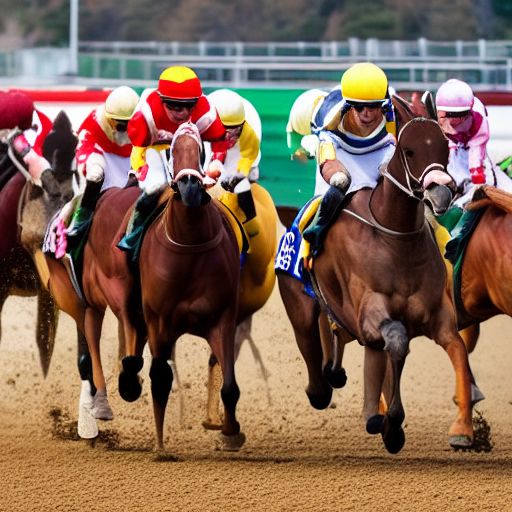The Japan Racing Association (JRA) is the primary governing body for horse racing in Japan. Established in 1954, the JRA oversees 10 tracks across Japan and holds over 2,000 races annually. It is one of the most successful horse racing organizations in the world, attracting millions of fans and generating billions of dollars in revenue.
History
Horse racing has been a part of Japanese culture for centuries, with the first recorded race held in the 12th century during the Kamakura period. However, it wasn’t until the Meiji Restoration in the late 19th century that horse racing was officially recognized as a sport by the government.
In 1907, the Tokyo Race Club was established, becoming the first organized horse racing association in Japan. The club held races at the Meguro Racecourse until it was destroyed during World War II. In 1946, the club was dissolved and replaced by the National Association of Racing, which oversaw all horse racing in Japan until the JRA was established in 1954.
The JRA was created as a public corporation under the jurisdiction of the Ministry of Agriculture, Forestry, and Fisheries. Its mission was to promote horse racing and improve breeding practices in Japan. The JRA also aimed to increase revenue for the government and provide entertainment for the public.
Structure
The JRA is a massive organization with a complex structure. At the top is the Board of Stewards, which is responsible for overseeing all operations and making major decisions. The Board is made up of 13 members, including a chairman, vice chairman, and 11 other stewards.
Beneath the Board of Stewards are various departments that handle different aspects of the JRA’s operations. These departments include:
- Racing Department: Responsible for organizing and managing all JRA races.
- Breeding Department: Oversees breeding regulations and maintains the JRA’s registry of Thoroughbred horses.
- Training Department: Provides training and education for jockeys, trainers, and other racing personnel.
- Veterinary Department: Monitors the health and welfare of horses and enforces animal welfare regulations.
- Facilities Department: Maintains and manages JRA tracks and other facilities.
In addition to these departments, the JRA has regional offices throughout Japan that coordinate with local racing associations to promote horse racing and support local communities.
Racing
The JRA holds races at 10 tracks across Japan, including the famous Tokyo Racecourse and the Kyoto Racecourse. Each track has its unique features, such as track layout and ground conditions, which can impact the outcome of races. Races are typically held on weekends and national holidays, with each track hosting several races per day.
The JRA offers a variety of races, including:
- Grade 1 Races: The highest level of JRA races, featuring the most prestigious events and the highest prize money.
- Grade 2 and Grade 3 Races: Mid-level races that offer substantial prize money and are considered stepping stones to Grade 1 races.
- Stakes Races: Smaller-scale races that offer lower prize money but still attract high-quality horses.
- Allowance Races: Races for young horses and those with less experience, offering lower prize money than stakes races.
The JRA also hosts international races, including the Japan Cup, which attracts top horses from around the world.
Betting
Betting is a significant part of the JRA’s revenue stream, with fans wagering on races both at the tracks and through off-track betting facilities. The JRA offers several betting options, including:
- Win: Betting on a horse to win the race.
- Place: Betting on a horse to finish in the top two or three.
- Quinella: Betting on two horses to finish first and second in any order.
- Exacta: Betting on two horses to finish first and second in the exact order.
- Trifecta: Betting on three horses to finish first, second, and third in the exact order.
- Superfecta: Betting on four horses to finish first, second, third, and fourth in the exact order.
Betting is heavily regulated by the JRA, with strict rules in place to ensure the integrity of races and prevent illegal gambling. The JRA also operates a responsible gambling program to promote healthy betting habits and prevent problem gambling.
Impact
The JRA has a significant impact on Japanese society and the economy. Horse racing is one of the most popular forms of entertainment in Japan, attracting millions of fans each year. The JRA’s races also generate substantial revenue, with the organization reporting over $26 billion in sales in 2019.
In addition to its economic impact, the JRA plays a crucial role in promoting horse breeding and improving the quality of Thoroughbred horses in Japan. The JRA’s strict breeding regulations have helped produce some of the world’s top racehorses, including Triple Crown winner and Japan Racing Association Horse of the Year, Deep Impact.
Conclusion. The Japan Racing Association is one of the world’s most successful and influential horse racing organizations. Its impact on Japanese culture, society, and the economy is significant, and its commitment to promoting healthy betting habits and responsible gambling sets an example for other racing organizations around the world. With a rich history, a complex structure, and a commitment to excellence, the JRA will undoubtedly continue to play a vital role in the world of horse racing for years to come.
